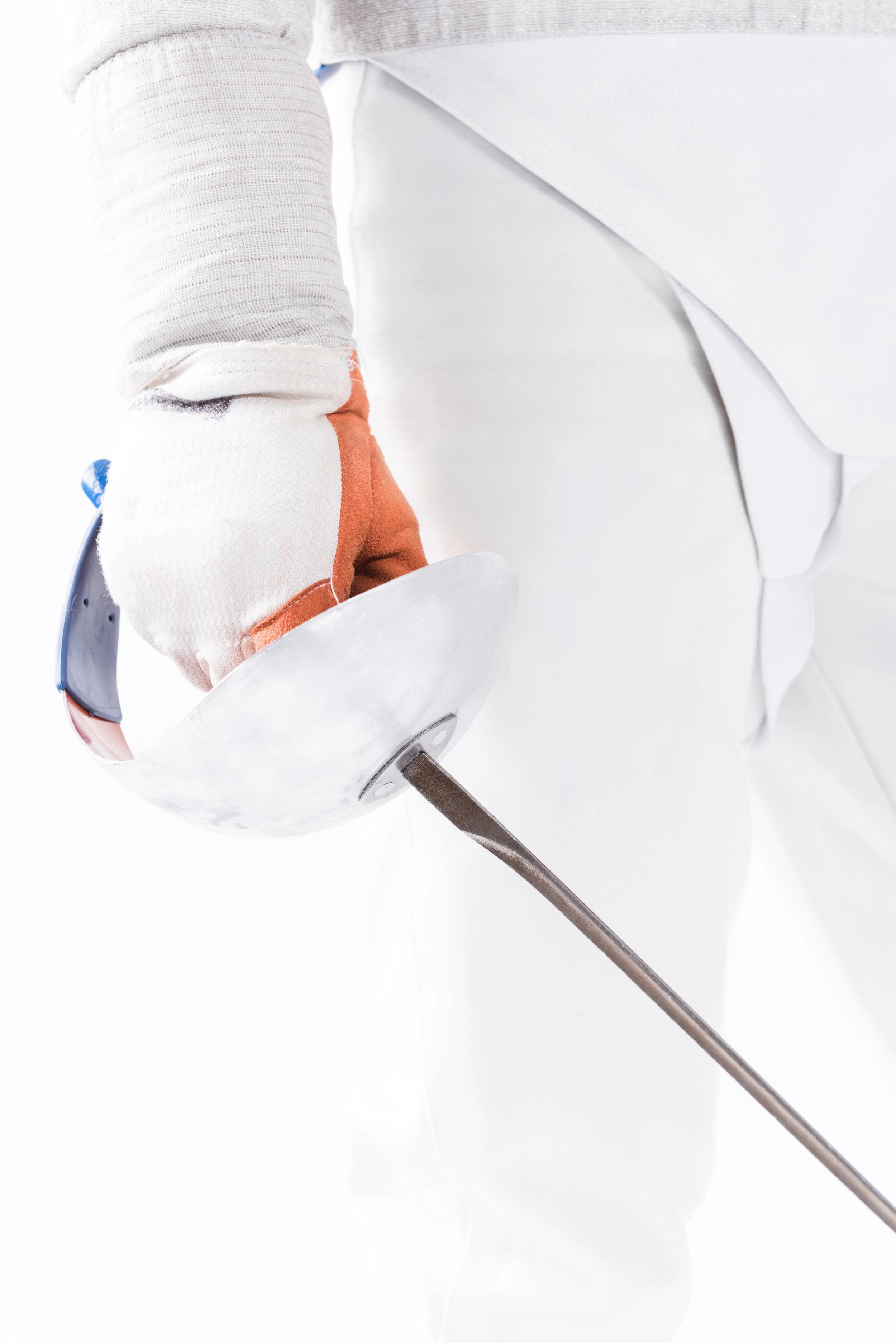
TOURNAMENT PREPARATION: The Body
Preparing your body for the tournament the right way can make all the difference
Rest & Recovery
Rest and recovery are the foundation of peak performance. The day before a tournament is not the time to squeeze in extra training or push your limits—it’s the time to let your body consolidate the work you’ve already done. Quality sleep restores reaction time, focus, and decision-making, while light activity keeps your muscles loose without draining energy reserves. Without proper rest, even the best tactics and strongest skills can feel sluggish on strip. Arriving fresh ensures that when the pressure rises, your body responds with speed, precision, and endurance.
Pre-Comp Rest & Recovery: The Big Five (Simple Edition)
-
Goal: Show up with clear eyes and good legs.
Do this:Go to bed a little earlier all week (aim for an extra 30 minutes).
Keep the same sleep/wake times (don’t yo-yo).
Dim screens the last hour; lay out gear before bed.
If last night was rough: do a 15-minute quiet break after lunch (eyes closed, slow breathing). No long naps.
-
Goal: Settle nerves; start each bout ready.
Do this (5 minutes):Breathe in through your nose, slow out through your mouth (about twice as long on the exhale).
Picture walking into the venue, warming up, and winning your first few touches.
Pick a cue word you like (e.g., “length,” “first step”).
On the strip: use your Reset Loop—step back, one slow breath, say your cue word, do your trusted opening action.
-
Goal: Feel fresh, not flat.
Do this (last 5–7 days):Shorter practices; leave while you still feel good.
Keep a few fast, crisp actions so your speed stays sharp.
Daily 10-minute loosen-up: ankles, hips, upper back; a few lunges; a few relaxed blade reps.
Morning of: 5–6 minutes of easy movement and 3 slow breaths.
-
Goal: Even energy; happy stomach.
Do this:Eat familiar foods; add a bit more rice/pasta/potatoes the day before.
Keep dinner earlier and light; breakfast = something you know sits well.
Sip water through the day; add one electrolyte bottle the afternoon before and one in the morning.
Skip: brand-new foods, heavy/greasy meals, or way more caffeine than usual.
-
Goal: Less stress, smoother day.
Do this (night before):Test gear and pack it: 2 working weapons, 2 body cords (and mask cords for sabre), tools/tape, socks, snacks, ID/membership.
Pack a mini recovery kit: small roller/ball, tape/band-aids, electrolytes, spare socks, simple snacks.
Plan to arrive 60–90 minutes early; when you get there, find check-in, equipment check, water, and warm-up strips.
Travel tip: stand up and move a little every hour on long rides.
Dinner the night before
Focus on simple, easy-to-digest carbs: pasta with marinara, rice with lean chicken, or a baked potato with vegetables.
Include moderate protein (chicken, fish, tofu) for muscle recovery.
Add salty foods (soy sauce, pretzels, broth) to preload electrolytes.
Avoid greasy, fried, or very spicy foods that may upset your stomach.
Morning of tournament
Eat something familiar you’ve used before practice/competition:
Oatmeal with banana and peanut butter
Toast with eggs and fruit
Yogurt with granola and berries
Keep it light but filling—no experimenting on tournament day.
Hydration strategy
Drink water steadily the day before.
Start the morning with a glass of water (optionally with electrolytes).
Avoid excess caffeine—it can dehydrate and spike nerves.
Why it matters: Proper fueling prevents energy crashes and dehydration, which are common causes of poor late-day performance.
Fuel & Hydration
Physical Readiness
Snacks to pack
Quick carbs: bananas, fruit gummies, applesauce pouches, pretzels, granola bars.
Mix of sweet + salty for variety and electrolyte balance.
Avoid chocolate bars or heavy protein snacks—they’re slow to digest.
Morning activation routine (5–10 min at home)
Dynamic stretches: arm circles, leg swings, torso twists.
Core + balance: planks, single-leg stands.
Footwork pulses: 2–3 quick advances, retreats, lunges to wake up reaction speed.
Breathing drills: 4–6 slow cycles to calm nerves and oxygenate.
Avoid burnout
Don’t “test yourself” the night before with a heavy session.
Don’t over-warm the morning of; save full intensity for the pool rounds.
Why it matters: You want to arrive feeling sharp, springy, and ready—not tired from overdoing it too soon.
Now, Prepare your Mind
Success in fencing hinges not only on physical skill but equally on mental readiness. Preparing your mind before stepping onto the piste is essential for peak performance. It all begins with a clear idea—your goal for the match. Whether aiming to outmaneuver an opponent, maintain composure under pressure, or execute a new technique, clarity of purpose sets the foundation for your focus.
Just as launching a business or sharing a creative project requires a strategic narrative, framing your mental story before competition shapes your actions and responses. Visualization techniques, positive self-talk, and mental rehearsal can align your mindset with your objectives. This mental preparation helps you remain resilient, adapt quickly during bouts, and manage stress effectively.
At Mind & Blade Academy, we emphasize that mastering your mental game is as crucial as mastering your physical moves. Cultivating a strong, focused mind begins long before the first touch of the weapon—it’s the mental framework that carries you through to victory.




